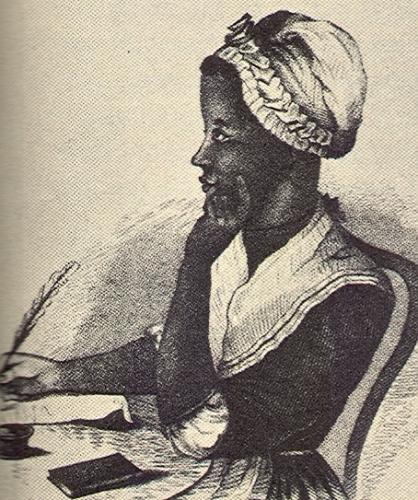 |
LITR 4231 Early American
Literature Sample Research Posts 2014 (research post assignment) Research Post 2 |
 |
Tiffany Robinson
How Pure were the Intentions of the Puritans?
During my research of Anne Bradstreet,
who practiced Puritanism, I read about the strict religious ways of the Puritans
and the demands that are put on its members to have an unwavering faith and
trust in God, despite all odds. I
knew very little of who the Puritans were prior to this course and considered
the Puritans and the Pilgrims one in the same.
What I have read on the Puritans during this course; is how they were a
moderate and conservative class of people, who sought out to reform the church
from within. The Puritans were a
big influence socially, politically and religiously and some say they have
helped to shape American culture. What are the Puritans core beliefs?
I am interested to know what demands are required of their members and if
they truly have the purest intentions in regards to faith and religion.
If I only went off the information I
read during my first research post; I would believe that the Puritans were a
controlling, woman-hating cult; yet most of the information I obtained for this
post painted the Puritans in a positive light.
One such article entitled
Puritanism and its Impact Upon American Values by Ning Kang explains that
“Puritanism is not only a religious belief, but a philosophy, a combination of
life styles with living values.”
They believed that they were God’s chosen people and they must do good in this
life. The religion was very demanding
because it wanted to be an example to others of what the church should
represent. They are considered a
shrewd and conservative people and to them; “worship should be plain, lack
mystery and be focused on God only. No
stained glass, instrumental music, or art.” According to the article, the
Puritans were advocates of living a humble and obedient lifestyle.
The Puritans were led by John Winthrop;
whose ultimate goal was to create a “Christian Utopia,” and membership was
conditional. It would only be natural for
such a demanding and strict covenant to have a like leader.
After reading up on the Puritans, I became interested in what type of man
could lead such a powerful group of believers. I came upon an article in the
Journal of Church and State which discussed Winthrop and his role as an
Imperialist. This particular
article referred to the Puritans as “Proto-Americans, who not only set the stage
for America, but should be retroactively incorporated into the constitution of
America’s self -conception today.”
John Winthrop was a strict Calvinist, which is a religion that stresses the
sovereignty or rule of God in all things, in salvation but also in all of life.
His vision was for his colony to set an example that the rest of the
world could follow and according to the article; “taking part in this kind of
covenant means being forced to do God’s work, no matter the cost in wealth,
reputation and life.” Winthrop
believed that one’s work was their witness to God, and that’s what would
ultimately matter in the end.
Being an example to the world is a big
responsibility, and to whom much is given, much is expected.
The article America’s Puritans
Today and the Religious Right explains that for those admitted into the
covenant there were strict rules and guidelines to follow, and setting an
example meant no room for sin or failure.
According to the article; “church attendance was mandatory and missing
church incurred a fine.” The
Puritans inflicted punishment on members who chose to stray from God’s work.
They believed that if you followed God’s law, you would live in peace, others
would not be so lucky. I learned
that both men and women were punished for a variety of crimes, and even children
can be put to death for as little as cursing their parents.
Puritans felt no remorse about administering punishment; public whippings
were held often and “adulterers were forced to wear a scarlet “A” or even
executed for their crime.”
The Puritans believed that the English
society was corrupted and needed to be purified; they believed that Godly people
were “sober, hardworking and responsible.”
To them hard work was a religious obligation with prominence on continual
self-examination and self-discipline.
The Puritans had strong beliefs regarding how one should serve God.
As a “saint” one is responsible for their actions.
They were extremely strict in their faith, because they believed their
soul depended on it; therefore, some of their practices came across as demanding
and overbearing. I learned a lot
about the Puritans that I did not know before; I found their religious efforts
to be aspirational yet misguided.
Works Cited
http://coursesite.uhcl.edu/HSH/Whitec/texts/AmClassics/puritans/Bradstreet/bradsndx.htm
Kang, N. (2009). “Puritanism and its impact on American
values.”
Review of European Studies,
Vol.1, 2.
Litke, J. (2012). “Varieties of
American Exceptionalism: Why John Winthrop is no imperialist.”
Journal of Church and State, Vol. 54, 2. p.
197-213.
http://endtimepilgrim.org/puritans13.htm
|
|
|
|

